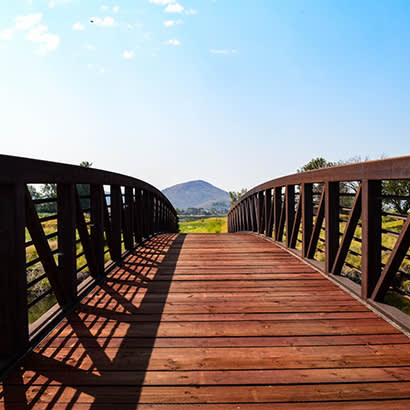
For an enhanced digital experience, read this story in the ezine.
It is the mission of Truckee Meadows Parks Foundation (TMPF) to protect and enhance our communities’ livability through public engagement, education, and the sustainability of our parks, open spaces and trails. TMPF is furthering this mission through the Rosewood Restoration Project. The 219-acre Rosewood Nature Study Area (RNSA), located in Reno, Nevada, operated as a municipal golf course from 1991 to 2015. The course was decommissioned when a regional roadway was built that bisected the property. Possibilities for reopening the golf course were considered, but ultimately the plan was deemed infeasible. The property remained vacant until fall of 2018 when TMPF began planning the restoration of the wetlands and the opening of the property as a nature study area. A community-led planning strategy began in collaboration with the City of Reno and the National Parks Service’s Rivers, Trails and Conservation Assistance Program.
Project Vision and Goals
The vision of the RNSA is to establish and steward a publicly accessible Great Basin wetland habitat, where the community can come to learn about and appreciate the importance of our natural open spaces and local parks. There are four main goals to accomplish this: develop a sustainable restoration plan for the property, rehabilitate existing paths and develop new trails, offer an environmentally conscious nature center, and inspire community members to take a proactive volunteer role in the preservation and improvement of our parks and open spaces.
Community Engagement
TMPF wanted to ensure the development of this project was not only community driven, but also created and built with diverse groups of the community. Public engagement played a vital role throughout the process — more than 1,300 community members participated in the development of the RNSA concept.
Volunteerism
To inspire individuals to take an active role in the improvement of their open spaces, TMPF hosts volunteer days at the RNSA. Volunteer opportunities range from invasive/debris removal to phenology tracking and more. Since January 2020, 270 volunteers have participated in events totaling 670 volunteer hours, worth more than $15,000 in labor. Volunteer events allow the community to actively participate in the restoration while helping TMPF accomplish its goals.
Restoration and Progress
The main focus of the RNSA restoration activities in the short term is removing invasive and noxious weed species from the property and concurrently planting ecologically-appropriate native species. TMPF is implementing an integrated pest management plan to target invasive weeds. For example, more sensitive areas that are being replanted to encourage pollinators are utilizing non-chemical invasive species removal techniques, whereas areas that are overrun with difficult perennial species will use a combination of mechanical and chemical approaches.
The native plants chosen for revegetation include species that are shown to be quality forage and habitat for wildlife, stabilize streambanks, and/or provide important ecosystem services. A mixture of woody and herbaceous plants is used along riparian areas to maximize bank stability and reduce erosion.
Future restoration efforts may include more intensive grading or topographic changes to increase water storage, but for the moment, TMPF is focusing on restoring the ecosystem services that wetlands can provide with appropriate vegetation and healthy soils. To date, 134 acres have been treated, 92 acres have shown improvement (percentage of coverage for native plants increasing or invasive plants decreasing), approximately 4,000 native plants have been established, and 12,500 linear feet of riparian area has been planted with stabilizing species.
Elena Larsen is Wetland Restoration Program Director at Truckee Meadows Parks Foundation.


